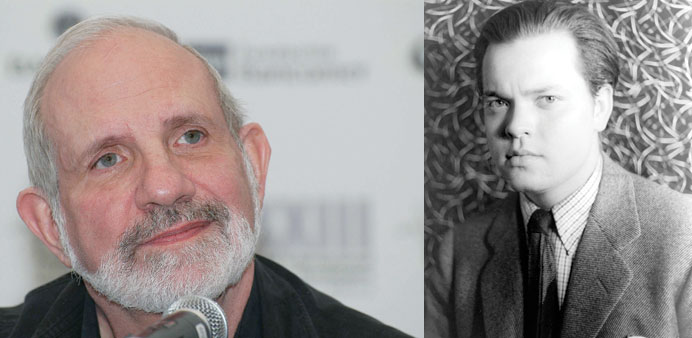MASTER DIRECTOR: Brian de Palma has directed stars such as John Travolta, Melanie Griffith, Tom Hanks and Sean Penn over the years. Right: LEGEND: Orson Welles would have turned 100 this past May.
By Gautaman Bhaskaran
That master whom we call Orson Welles would have been 100 last May, and the Venice Film Festival will honour this director on September 1, a day before the 11-day event on the island of Lido (off Venice) begins. Indeed what a wonderfully fitting tribute to a genius with the Festival marking the start of its 72nd edition even before the actual unspooling of movies gets under way.
Two of Welles’ Venetian masterpieces — inspired by Shakespeare and digitally restored — The Merchant of Venice (1969) and Othello (1951) will be screened on September 1.
The Merchant of Venice was thought to have been lost, but by some strange providence, it was found and turned into a sparkling new print.
At Venice, I have always been reminded of this poignant play about mercy and justice and avarice. The Rialto Bridge is but one strong reminder, and The Merchant of Venice talks about it in its opening pages. In Act I, Scene III, Shylock the Jew asks: What news on the Rialto? Solanio poses the same question in Act III.
For many centuries, the Rialto has been the financial and commercial centre of Venice. Today, it is also known for its markets that sell an alluring variety of curios and other goods. More importantly, the Rialto is also renowned for its bridge across the Grand Canal that has motor-boats and gondolas sailing past in scenic splendour.
The world premiere of the new copy of The Merchant of Venice (reconstructed by Filmmuseum München and Cinemazero) in colour brings to life the dramatic plot, culled from a newly discovered script. Welles began working on this in 1969, but did not complete.
In 1982, Welles claimed that the negative of The Merchant of Venice was stolen in some mysterious way. But thanks to a sensational find by Cinemazero, the film will now come to life at Venice.
The Merchant of Venice is the last Shakespeare movie by Welles. Conceived as a part of an American television serial, the work was shot on location in Venice, Asolo, Rome and Trogir on the Dalmatian coast. It graphically portrays 17th century Venice and the key elements of Shakespearean times.
Once Welles had declared: “My own dream part is Shakespeare’s Jew. It happens I’m a Christian (not that it matters), but I’ve always felt a special sympathy for Shylock, and I’ve wanted to communicate that sympathy to a loving audience.”
Othello, of course, as we know was the Moor of Venice, who, consumed by raging jealousy, kills Desdemona.
The original, full-length version of Othello — restored by Cineteca Nazionale in Rome — is an Italian version, with dialogues written by Gian Gaspare Napolitano and supervised by Welles himself. The film was to have been part of the Venice Competition in 1951. But Welles withdrew his work at the last minute saying that it was not ready. A new shorter version in English was presented at the Cannes Film Festival in May 1952, and won the Grand Prix. Now, this rare Italian version finally comes to the Lido.
Venice will also fete another auteur, America’s Brian de Palma. He will be presented with the Jaeger-LeCoultre Glory to the Filmmaker Award. This is dedicated to personalities who have made particularly original contributions to contemporary cinema.
The prize will be presented on September 9. This ceremony will be followed by the world premiere of the documentary, De Palma, by Noah Baumbach and Jake Paltrow. The movie grew out of a 10-year association between these two chroniclers and De Palma, and will trace his six-decade-long career, his life and his filmmaking process.
This major award consolidates the bond between the Festival and De Palma, who has screened seven of his movies on the Lido, the first time 40 years ago — Sisters (1975). In the years that followed, he showed Blow Out (1981), The Untouchables (1987), Raising Caine (1992), Black Dahlia (2006), Redacted (2007, which won the Silver Lion) and Passion (2012).
Born in 1940, De Palma studied film in New York. In 1963, he directed The Wedding Party, giving 20-year-old Robert De Niro his debut role. Carrie in 1976, a movie starring Sissy Spacek and based on the Stephen King novel, was De Palma’s first big success.
To date, De Palma has directed over 30 films, including The Untouchables with Robert De Niro, Kevin Costner and Sean Connery; Mission Impossible (1996) with Tom Cruise; and Scarface (1983) with Al Pacino.
Over the years, De Palma has directed stars such as John Travolta, Melanie Griffith, Tom Hanks and Sean Penn.
De Palma is particularly famous for his psychological thrillers, which feature his personal style, unusual camera angles and elements that often recall works by the directors who have influenced him, in particular Alfred Hitchcock.
The Festival runs from September 2 to 12.
* Gautaman Bhaskaran will cover the Venice Film Festival, and may be e-mailed at [email protected]

